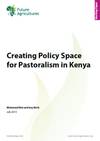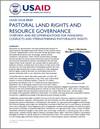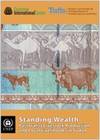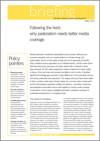At its meeting of 26 November 2012, the Bureau of the ACP-EU Joint Parliamentary Assembly authorised its Committee on Social Affairs and the Environment to draw up a report, pursuant to Article 2(8) of its Rules of Procedure, on the social and environmental impact of pastoralism in ACP countries.
Year of publication: 2013Organization: Union européenne (EU)
Topic: Services environnementaux, Organisation
Language: English
Type of document: Technique, Politiques et législation
Geographical coverage: Amérique Latine, Afrique occidentale, Afrique centrale, Afrique orientale, Afrique australe, Océanie
This paper reflects on the work of the Ministry of State for Development of Northern Kenya and other Arid Lands between its formation in April 2008 and the elections of March 2013. The paper begins by summarising the historical, political and institutional contexts within which the Ministry was created, as well as the multiple narratives that have driven policy in Kenya’s drylands over time. It explains some of the policy choices the Ministry made in interpreting its mandate and shaping the policy agenda. The paper reflects on the response of different actors to the policy space opened up by the establishment of the Ministry, and looks at how it implemented its mandate and its day-to-day engagement with others. The authors discuss the institutional framework in more detail and the steps required to strengthen it further. The paper concludes with reflections and recommendations.
Year of publication: 2013Organization:
Topic: Économie, Services environnementaux, Sécurité alimentaire, Organisation, Résilience
Language: English
Type of document: Scientifique
Geographical coverage: Afrique orientale
This briefing paper argues that the erosion of pastoral resource entitlements was hardly a topic for discussion in the early 1980s, but it is the single most critical impediment to contemporary pastoral development. Despite progress on many other fronts, pastoral land rights are under pressure as never before, and the issues of resource governance discussed in this brief are at the crux of the future of pastoral peoples.
The paper presents a comprehensive summary of current challenges to pastoral land rights and resource governance in developing countries. Further, it makes recommendations for managing conflicts and strengthening pastoralists’ rights, and explores the potential role of USAID in addressing these issues.
Year of publication: 2013Organization: Agence des États-Unis pour le développement international
Topic: Conflit, Régime foncier, Résilience
Language: English
Type of document: Technique
Geographical coverage: Amérique Latine, Proche-Orient, Afrique du Nord, Afrique occidentale, Afrique centrale, Afrique orientale, Afrique australe, Asie centrale, Asie du Sud
This research analyses the conflict situation in Karamoja, Uganda. Its findings are based on community meetings in Moroto and Kaabong Districts, interviews with peace actors, stakeholders, partner organizations, field visits, trainings and literature research. It gives recommendations for conflict sensitive programming and sustainable peace interventions.
Year of publication: 2013Organization: Vétérinaires Sans Frontières (VSF)
Topic: Conflit
Language: English
Type of document: Scientifique
Geographical coverage: Afrique orientale
This report highlights the importance of pastoralist livestock production for the Sudan's economy, and outlines ways in which pastoralism can be supported in the future. The economic value of pastoral livestock production is largely hidden, both in the official statistics, and in relation to the domestic market and subsistence economy (e.g. milk). The report argues for an informed, effective and equitable integration of pastoral systems within national policy and legal frameworks, in order to legitimize this form of land use and to underpin a more constructive approach to modernization of the livestock sector. The findings indicate that unleashing the potential of the livestock sector in Sudan requires securing the conditions for livestock mobility, so that livestock can access pastures selectively, when the nutritional value of plants is at their peak. This requires the return of security in pastoral areas and along livestock routes, and a regulation of markets in land (in pastoral areas), water for livestock, and crop residues.
Year of publication: 2013Organization:
Topic: Économie, Régime foncier, Value addition
Language: English
Type of document: Technique, Scientifique
Geographical coverage: Afrique orientale
La Déclaration de N’Djaména, adoptée par des Ministres en charge de l’élevage et de la sécurité de nombreux pays africains, appelle la communauté sahélienne, ouestafricaine, centrafricaine, nord-africaine et internationale, à s’unir dans un esprit de paix, de tolérance et de partage pour construire ensemble la paix et le développement des espaces saharo-sahéliens en valorisant le pastoralisme, seul à même d’en entretenir la stabilité.
Year of publication: 2013Organization: Auteurs individuels
Topic: Participation
Language: العربية, English, Français
Type of document: Politiques et législation
Geographical coverage: Afrique du Nord, Afrique occidentale, Afrique centrale
See how members of arbale pastoral field school in Borana Zone, Southern Ethiopia are applying knowledge gained to implementing community managed disaster risk reduction action plans for the protection of vast areas of communal grazing lands.
Year of publication: 2013Organization: Organisation des Nations Unies pour l'alimentation et l'agriculture (FAO)
Topic: Organisation, Services sociaux
Language: English
Type of document: Vidéos
Geographical coverage: Afrique orientale
Mobile pastoralism contributes substantially to food security, livelihoods and economic prosperity, and can increase resilience to climate change; but policymakers, donors and the public at large tend not to appreciate its benefits.
Policy narratives portray pastoralism as an outdated practice, and the media stories that help shape policy processes and public opinion often contribute to these false portrayals. An IIED study analysed the content of stories from media outlets in Kenya, China and India, and surveyed journalists in each country. It identified significant knowledge gaps and inter-country differences in how journalists perceive and portray pastoralists and pastoralism. The analysis also found that media outlets in these countries under-report climate change, the economic value of pastoralism and the links between pastoralist mobility and resilience.
Journalists, researchers and pastoralist communities need to work together to improve media coverage of pastoralism, and by doing so highlight pastoralism’s potential contribution to sustainable development in a changing climate.
Organization: Institut international pour l'environnement et le développement (IIED)
Topic: Changement climatique, Value addition
Language: English
Type of document: Technique, Politiques et législation
Geographical coverage: Global









